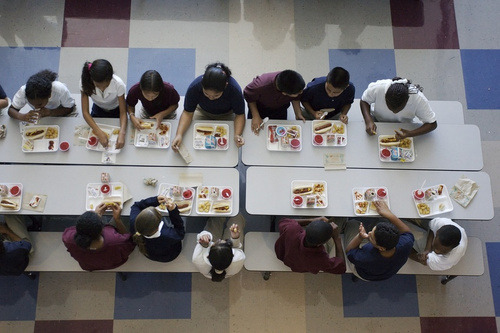NPR reports on how the US is a little bit late to overhaul school lunches yesterday, and provides an awesome slideshow of who’s got what & where. (London’s makeover is extremely impressive)
school lunches
That’s What She Said
Part of a righteous post by Zuzu on Feministe that pertains to a lot of the issues we talk about here:
[W]henever we start focusing on the health of the individual, we erase the systemic problems that contribute to health issues. This is a perfect example of the personal being political.
Institutions love to shift the burden onto the individual, because it means the institution doesn’t have to examine its own behavior or its own contribution to a problem. Let’s look at bullying. States and schools love to have zero-tolerance policies so they can look like they’re being tough on bullying — but then when bullying incidents happen, they just don’t define it as bullying, and suggest that the victim change his or her behavior. Problem solved!
Then we have childhood obesity prevention programs. Sure, they sound good, but ultimately, they put the burden on the kid to change while leaving intact many, many things that contribute to the problem. This may include fat-laden agricultural surplus products that find their way into the school lunches; vending machines and bake sales used for fundraising because taxpayer funds are unavailable; cutbacks in physical education and extracurricular sports; lack of safe spaces to walk or exercise; lack of sidewalks; corn subsidies that result in high-fructose corn syrup showing up in everything; high housing prices that lead to long parental commutes and thus a reliance on takeout over freshly-prepared foods; food deserts; aggressive marketing by fast-food outlets; food-assistance programs that are designed to dump agricultural surplus rather than provide good nutrition; agricultural subsidies that mean that vegetables are more expensive than cheap fatty meats; lack of access to affordable preventive health care; lack of education about nutrition; and on and on.
An awful lot for a little kid to carry on his or her shoulders, don’t you think?
And it’s not just kids that get this kind of treatment, it’s adults as well. How dare you be fat at me, Ms. Medicaid Recipient? Maybe they should cut your food stamps off if you’re going to be so fat! That the face of poverty is widely considered to be black, female and fat — today’s version of the Welfare Queen in her Cadillac — just makes the problem more intractable.
But it’s a fight worth having, and it’s a fight that feminists [and foodies—ed.] should be waging. So instead of scoffing next time you see someone criticizing the use of the BMI as an indicator of individual health, try listening, and considering. You might just see that the problem is bigger than you realize — and it might even hit home for you.
______________
The Hunger

The NYT writes about a study today that suggests (the sample was only 20 people) metabolic factors affect decision-making–in short, hungry people take bigger risks. As one person pointed out in the comments, it seems to make evolutionary sense. If you’re full, no need to chase after that scary woolly mammoth or hike into unknown territory. If you’re hungry, it might seem worthwhile.
I was intrigued that the Times chose to frame their discussion of the findings in terms of wealthy finance-industry players, writing, “Maybe what Wall Street’s risk-loving bankers really need is a better diet.” They even had a picture of a fat cat!
Really, New York Times? Exactly how hungry do you think people on Wall Street are? I’m guessing: Not at all. Is there any evidence at all that rich folks are hungry, other than maybe those on diets? The Times is all hahah, maybe we can blame the financial meltdown on this! It’s so telling to me that they didn’t think that perhaps hunger made the victims of Wall Street more vulnerable to the hucksterism and shady dealings of sub-prime predators.
The study itself used purchasing lottery tickets as its measure of risk-taking behavior. The subjects who were hungry chose riskier odds. Hmm, who plays the lottery in real life? It is disproportionately people with lower incomes. A Carnegie-Mellon study found that (surprise), those with fewer resources are more desperate for changes in their circumstances and find the concept of a lottery appealing, because, in theory, anyone can win.
We know the brain needs food. That’s why school lunch programs and making sure children eat breakfast are so important. That’s why we support NYC’s free meal program for children under 18. That’s why we were dismayed to read today that so many states and municipalities are cutting such programs, especially during a time of economic crisis. Because we are a lot more worried about kids going hungry than we are about bankers missing a meal.
–Snacktime
Who Is Entitled To Lunch?
School lunch, in fact, is one of the few entitlement programs left in America.
From Tracie McMillan’s astute discussion of the new movie “Lunch Lines,” about school lunch programs.
More Hot School Hookups
School Lunches Are Matter Of National Security!

The group Mission: Readiness, a nonprofit led by retired military leaders, has issued a report that America’s children are too fat to fight. (PDF download here.) A member of their advisory council, General Johnnie E. Wilson (Ret), says:
“Child obesity has become so serious in this country that military leaders are viewing this epidemic as a potential threat to our national security. We need America’s service members to be in excellent physical condition because they have such an important job to do. Rigorous service standards are critical if we are to maintain the fighting readiness of our military.”
It’s bad enough that, thanks to the Patriot Act, schools are required to turn student records over the the military, and that recruiters strategically target vulnerable kids. Now they’re complaining about the quality of the recruits?
Mission: Critical is calling on Congress to increase funding for better nutritional standards in school, to get junk food out of schools, and to increase funding for obesity reduction programs.
Obviously I don’t have a problem with those goals. Then again, there would be more money for school lunch programs if we weren’t spending so much on the military! The National School Lunch Program budget is about $9 billion per year. The military budget is what, a hundred times that? I have a problem with that not being part of the conversation.
Mission: Critical has also asked for better early-childhood education in Mississippi (PDF link) and other states, saying that:
“Commanders in the field have to trust that our soldiers will respect authority, work within the rules and know the difference between right and wrong. Early learning opportunities help instill the qualities that make better citizens, better workers and better candidates for uniformed service.”
Early-childhood education? Another worthy goal. But is anyone else creeped out by the idea that this organization views children only as potential soldiers? Enjoy your lunch, kids, you’ll be shipping off soon.
Lunchtime Politics II: School Cafeteria Hell

I was just reading through some of the “school lunches” tags on SUF (such as this one), I started thinking about my own past with lunch.
So, I’ll admit it – I used to eat Lunchables as a kid, when they first came out and even for a few years after. I remember them being a special treat (they were like $3 or $4 which is a lot more than a loaf of bread, some bologna, and some mustard which would last over a week). I don’t think there was much thought to them being high in sodium by parents, hell – I think everything in 1988 was high in sodium. But I do remember thinking, as a kid, it was finally *not* embarrassing to open my lunchbox. I had something fancy in there.
I wonder what the kids think is fancy now? By 5th grade it was not cool to bring your lunch, it was what the “nerds” (read: poor kids) did. I would beg to get the cafeteria food, and sometimes the $2 charge a day wasn’t ok. I wonder if now eating the “school lunch” is embarrassing, when the prettiest/richest/most popular kids are bringing pan-seared tuna with greens and an organic juice box. I mean, we are essentially taught that food is based on class from our earliest days.
How depressing.
Lunchtime Politics
A former school food administrator on Jamie Oliver’s program (thanks LA Foodie for the tip:
The school lunch program is broken and it will take the critical mass of a lot of people saying this isn’t right and demanding change. Nowhere in the Child Nutrition Act is there any requirement for nutritiona education. In my years as a Director I never saw, nor was I asked about nutrition education curriculum. It was, however, a topic of concern and discussion among my peers, we saw the need but no one listened. Today’s parent can’t shoulder this burden by themselves because most likely they didn’t receive much in the way of nutrition education either.
School meal programs are current up for reauthorization and are being actively discussed by Congress. If you’re concerned, outraged or simply want to see change, write to your local representative and state senators. Demand systemic change in the way the program is administered and operated. Demand training, demand nutrition education, but let your elected officials know that how we’re treating our youth of American with the existing program isn’t acceptable to you.
You know what’s better than blogging? Action. Here’s some links that will get you in touch with your Congressional reps.
—Snacktime
PS I wanted to note I queued this up last night before the Jamie Oliver palooza of this morning but I still think it is good reading.
FYI: School Lunches Are F-d Up
Poor Kids Aren’t Stray Dogs.

I know Jamie Oliver is gearing up to overhaul American school system food in terms of health and wellness, but maybe his presence in Andre Bauer’s South Carolina could do a bit of political good too?


